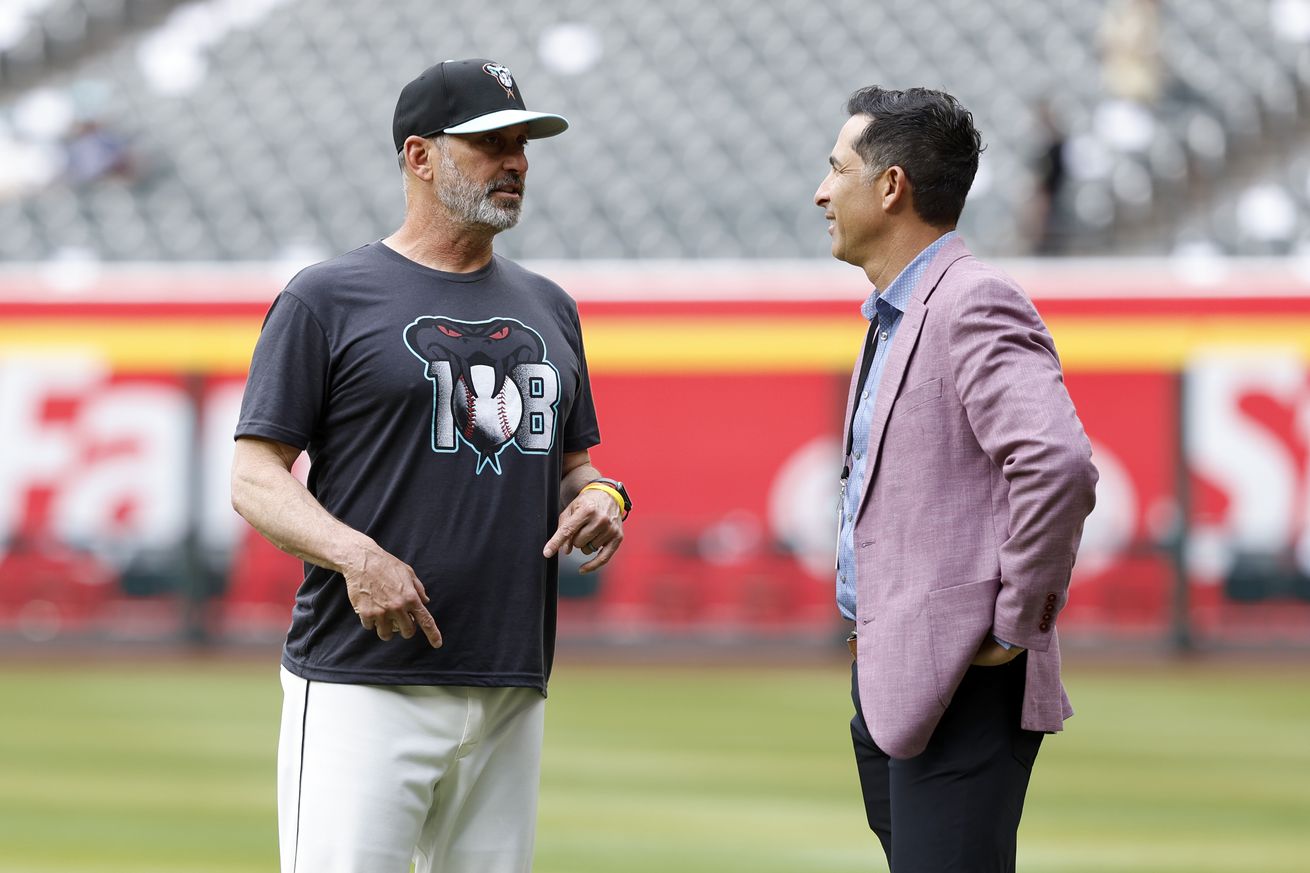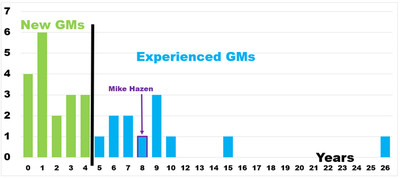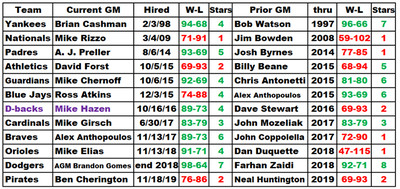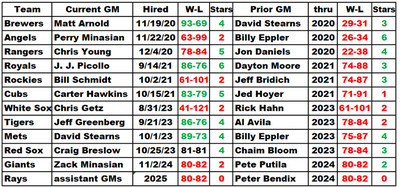
Experienced GMs win more often.
Inspiration.
This article was inspired by Farhan Zaidi, who recently lost his position as President of Operations for the Giants (although I thought of him as their GM). What I concluded from hearing him talk was that he lost his position by not obtaining star players, which led platooning, which was not well received. I wondered, which had the bigger impact: win-loss record or number of star players? However, let’s have a broader look at GMs before we answer the question.
What is the tenure of current GMs?
The following histogram shows how long the current GMs have held their position.

Years GM experience for MLB teams. Data from Wikipedia and Baseball Reference,
As we look deeper, there are two groups of teams: Those who have kept their GM for 5 or more years (12 teams with experienced GMs), and those who have a new GM (18 teams).
Teams with experienced GMs win more often.
These teams have an excellent ratio of 2 to 1. Looking at teams who have kept their GM for 5 or more years: last season 8 teams had a winning record and 4 teams had a losing record.
The other teams don’t compare well. Looking at teams with a newer GM, 9 teams had a winning record, 1 team had an even-steven record, and 8 teams had a losing record. That ratio is about 1 to 1 (nothing special).
Why did teams change their GMs?
Teams with long-tenured GMs. In their last season as GM, all seven GM who left (prior to the current GM) had a losing record (although one simultaneously had the FBI investigating skimming from Latin American prospects, and one simultaneously had MLB investigating amateur signing infractions). One surprise is that with a losing record in his last season, Billy Bean was promoted to vice president of baseball operations. One point in his favor may have been that despite his losing record, he had 5 star players on his team. My definition of star players was those having a bWAR of at least 3.0.
Dave Stewart, who left his position as GM of the Diamondbacks, solidly belongs in the group of GMs with losing records in their last season as GM. This article ranked the five worst decisions made while he was GM.
What about the 5 GMs who left (prior to the current GM) but who had winning records? Three were promoted to president or (executive vice president). One of the three, Farhan Zaidi was stolen by another team (the Giants). One (Alex Anthopoulos) turned down a five year extension, upsetting the Blue Jays so much that they fired him. One (Bob Watson) resigned because the stress of being yelled at and the constant threats of being fired.
Except for Billy Bean’s team, no team with a losing record had more than 2 star players. Teams with winning records had between 3 and 8 star players. Farhan Zaidi was insightful when he talked about the importance to the GM of having star players on the team.
The following table shows the 12 teams with long-tenured GMs.

Experienced GMs & their prior GMs. Data from Wikipedia and Baseball Reference.
Teams with new GMs. The last 5 years have experienced turmoil. The correlations became more chaotic.
For 12 GMs with losing records in their last season as GM, five left their position for a promotion. What happened to them follows:
- 7 GMs were fired due to their poor results (one simultaneously resigned due to an investigation of fabricated player injuries).
- 2 GM remained as President of Baseball Operations (having been simultaneously GM and president of baseball operations.)
- 1 GM was promoted to President of Baseball Operations
- Peter Bendix left the Rays to become President of Baseball Operations for the Marlins.
- Chaim Bloom left the Red Sox but the Cardinals announced he will become their President of Baseball Operations “after the 2025 season.” That one year delay is extraordinary.
For teams with new GMs, the following table shows the 12 prior GMs with losing records.

Teams with new GM and prior GMs had losing records. Data from Wikipedia and Baseball Reference
For 6 GMs with winning records in their last season as GM, teams seemed to have an attitude of under-appreciating their GM. What happened to them follows:
- Kim Ng, having become the first woman GM to lead her team to the playoffs, rejected her one year contract. Perhaps more importantly, she was not offered a promotion to President of Baseball Operations.
- James Click, having led his team to winning the World Series, rejected his one year contract left the Astros to become a vice president of the Blue Jays.
- Sam Fuld will become president of team business operations in 2026 (after leaving his GM position to obtain an MBA degree). Remarkably, he had 9 star players in his last season as GM.
- Thad Levine left his position as part of preparations to sell the team.
- 2 GMs remained as President of Baseball Operations (having been simultaneously GM and President of Baseball Operations.
For teams with new GMs, the following table shows the 6 prior GMs with winning records.

Teams with new GMs with prior GMs had winning records. Data from Wikipedia and Baseball Reference.
How many GMs left with immediate promotions?
Nearly half of GMs were so successful that when they left their position they received immediate promotions. 13 of 30 GMs left with immediate promotions. That’s a great way to leave a job!
It seems that less than half of GMs left because the team wanted a better GM (after counting 2 GMs who left after not receiving better offers from their team and 1 GM left due to stress).
Summary.
There are two groups of teams (12 teams with experienced GMs and 18 teams with newer GMs). The experienced GMs win more often.
For the first group, in their last season as GM, all seven GMs who left (prior to the current GM) had a losing record. Billy Bean had a losing season but was promoted, possibly because he had 5 star players on his team.
In general, teams with winning records had between 3 and 8 star players, and most especially teams with experienced GMs. Farhan Zaidi was insightful when he talked about the importance to the GM of having star players on the team.
Nearly half of GMs were so successful that when they left their position they received immediate promotions.
